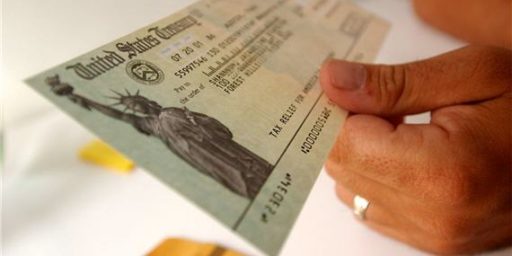Tax Rebates Coming in June
In a classic case of too little, too late, the administration and Congress have reached a deal on a stimulus package.
Congressional leaders completed a deal Thursday with the White House on an economic stimulus package that would give most tax filers refunds of $600 to $1,200, and more if they have children.
[…]
Individuals who pay income taxes would get up to $600, working couples $1,200 and those couples with children an additional $300 per child under the agreement. Workers who make at least $3,000 but don’t pay taxes would get $300 rebates.
The rebate part of the plan would cost about $100 billion, aides said. The package also includes close to $50 billion in business tax cuts.
The package would allow businesses to immediately write off 50 percent of purchases of plants and other capital equipment and permit small businesses to write off additional purchases of equipment. A Republican-written provision to allow businesses suffering losses now to reclaim taxes previously paid was dropped. Pelosi, D-Calif., agreed to drop increases in food stamp and unemployment benefits during a Wednesday meeting in exchange for gaining rebates of at least $300 for almost everyone earning a paycheck, including low-income earners who make too little to pay income taxes.
One hesitates to call such a thing a “rebate,” given that the term implies giving a portion of something back, but it likely makes sense if one’s goal is to pretend to stimulate the economy.
Given that the government collects money via a system of withholding, one wonders why waiting until June to send out checks — or even sending out checks at all — is necessary. Couldn’t they just let people keep more of their money in February?
UPDATE: John Aravosis critiques the plan — from the left, no less — by noting that it screws over the rich and middle class, including those of us who live in major metropolitan areas where the ceiling of $75,000 isn’t that much money. Of course, the Democrats have been complaining about tax cuts going mostly to the rich — i.e., those who pay taxes — for decades, so this outcome shouldn’t be particularly surprising.






Oh, you wanted to stimulate the economy NOW?
Joking aside though, I would imagine it would be difficult and/or costly for most companies to alter their payroll systems to do this.
That and getting a check in the mail is a physical manifestation of people’s government “doing something to help me”, where as slightly larger paychecks may not be directly attributed to our all caring politicians. And we all know how much they want us to remember this “rebate” package they gave us in November. Actually, I’m surprised they’re not waiting until October to give them out, and having them signed by your local congressman.
Damn, Michael beat me too it!
If they really wanted to stimulate the economy, however, they would lower the tax rate across the board and let people keep more of their earned cash. As pointed out (Michael!) this would not be readily perceived as “the government’s doing something for me” by most people. Further, if the reduction were as a percentage, it would infuriate the Democrats because the “wealthy” would get a larger dollar reduction even if it were the same percentage.
Yeah, those in higher income tax brackets would just waste their political-stunt check by investing or saving it. Whoever heard of investment being good for an economy? It will be much more effective to borrow money to give it to people who will rush out and stimulate the economies of the countries who make things sold at Best Buy.
BTW, Aravosis went all sorts of chicken-you-know-what regarding the beating he took from his commenters, and changed the url